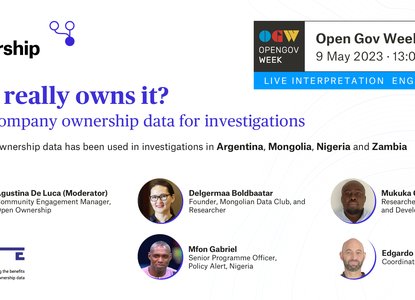Who really owns it? What investigations using ownership data can tell us

Photo by Chris Liverani, Unsplash.
Journalists and civil society have a key role to play in promoting good governance, preventing and detecting corruption, and demanding accountability from those in positions of power. And so we ask: how can we harness the potential of investigations into who really owns, controls, and benefits from companies and other corporate vehicles?
Opening Extractives, implemented by Open Ownership and the Extractive Industries Transparency Initiative, is supporting activists from three continents to do just that. This Open Gov Week we are excited to announce that they will be sharing what they have found, plus what they have learned along the way. Opening Extractives has been training these and other investigative journalists and civil society partners to aid understanding as to how simple and complex ownership structures operate transnationally. We have also been providing funding and technical support to help them conduct research that can inform their investigative articles and campaigning projects.
Now is the chance for them to share their findings during our Open Gov Week webinar on 9 May: Who really owns it? Using company ownership data for investigations.
Ruido and Fundeps will walk us through what they discovered whilst looking into the ownership and management of lithium extractive companies operating in the northern provinces of Argentina – the fourth biggest producer of lithium-derived products globally. Complex ownership webs, the involvement of big international banks, companies, and investment funds, and challenges in accessing information – this is an eye-opener.
The Mongolian Data Club will share how they waded through poorly structured data and analysed and connected multiple sources to investigate coal transport licences. It took great effort for journalists to master how to access and use the available data sources to join the dots and ask the right questions, and the findings are powerful. They came across some interesting insights regarding how many (or rather, how few) people actually benefit from hundreds of these licences. They also have a new data visualisation tool to share.
Meanwhile in Zambia, the Centre for Trade and Policy Development looked into beneficial ownership in the mining sector. Despite limited information being available as open data, they persisted and widened their net, covering online sources and articles, company reports, and more. They ask, could a loss of government revenue be linked to noncompliance with the Mineral Royalty Tax?
And our colleagues at Policy Alert in Nigeria in partnership with the Tax Justice Network Africa looked into the beneficial owners of four oil and gas companies and their involvement in oil-for-product swaps. These swaps are complex barter agreements where oil companies and private traders swap crude oil for refined petroleum products, rather than for money. Policy Alert had some wins and is paving the way for improved transparency, which will be revealed on 9 May.
As well as key insights based on these findings, our partners will reflect on their experiences investigating beneficial ownership, and their recommendations for better civil society and government partnerships around this.
Our Open Gov Week webinar will bring together these diverse experts for a compelling discussion on how beneficial ownership data from multiple sources can be linked with other data types, reports, articles, and more, to highlight who really benefits from companies. This promises to be a lesson in how using open company data and investigative tools can impact transparency and improve open governance.
Places are filling up, so register today!
